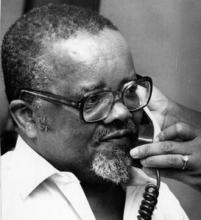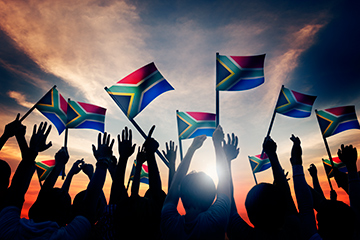Mandela and Gandhi: Reading Conversations with Myself and Experiments with Truth, was the title of the 21st Alan Paton Lecture presented by Professor Sarah Nuttall in the Colin Webb Hall on the Pietermaritzburg Campus.
Nuttall, Director of the Institute of Social and Economic Research (WiSER) at Wits University, began her reflections on Mandela and Gandhi by remembering Alan Paton. She referred to Paton’s testimony during the 1964 Treason Trial saying he was the only witness called in mitigation before sentencing in a trial in which the judge was expected by many, including Nelson Mandela, to hand down the death sentence.
According to Nuttall, Paton put forward a clear proposition: that ‘the African people in South Africa had the same hopes and aspirations as people of any other race; that is, to live a decent life’.
The central part of her lecture described and analysed two texts. The first was Nelson Mandela: Conversations with Myself, which is a discussion of a text published in 2010 by Mandela, and edited and compiled by Verne Harris and researchers at the Mandela Centre for Memory and Dialogue. The second text was Mahatma Gandhi’s autobiography The Story of My Experiments with Truth.
Nuttall compared Mandela’s and Gandhi’s political vision, their processes of personal transfiguration, and their relationship to their own bodies, to the world of the senses and to self-discipline, self-writing, death and loss, abnegation and memory, and to the dreamworlds of the long 20th century.
She said: ‘There is much in his (Mandela’s) life and thinking that invites conversation in relation to the projects of inner liberation and human emancipation undertaken by figures like Gandhi, Martin Luther King and Ang San Suu Kyi, and which has hardly yet been properly studied. The fact that Mandela may have been one of the rare South African political leaders versed in the practice of deep introspection has been altogether neglected.’
Nuttall said Gandhi’s autobiography involved the practical applications of Gandhi’s principles, his experiments with non-violence, celibacy and other principles of conduct he increasingly believed in. ‘Ghandi wrote: “The truth is not only truthfulness in word, but truthfulness in thought also, and not only the relative Truth of our conception but the Absolute Truth, the Eternal Principle that IS God”.‘Gandhi like Mandela, said he was “prepared to sacrifice the things dearest to me in pursuit of this quest. Even if the sacrifice demanded be my very life, I hope I may be prepared to give it”.’
Nuttall said Mandela and Gandhi, two of the 20th century’s greatest men, were similar and different in ways that history and scholarship had barely begun to unravel. She concluded by saying there is much in Gandhi’s life and politics that is in conversation with Mandela’s.
Born in South Africa and educated at the former University of Natal and the University of Cape Town, Nuttall won a prestigious Rhodes Scholarship to read for a D.Phil at Oxford University. A literary scholar by training, her varied research interests and prolific publication record have established her as a leading cultural commentator and critic as well as one of the leading scholars of her generation. She has edited and written path-breaking books and is a member of the editorial boards for several journals.——————————————————————————————-




